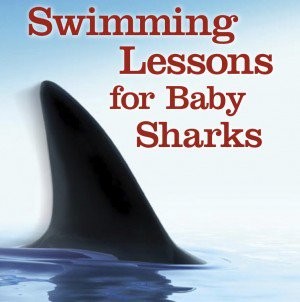Swimming Lessons For Baby Sharks, Practical Advice For New Lawyers
Everyone says I should do informational interviews. Any advice on how I should go about this?
Q: Everyone says I should do informational interviews. Any advice on how I should go about this?
A: Yes. Informational interviews can help you in several ways. But you need to plan before you dive in.

The Business Case For AI At Your Law Firm

Here are some tips to make the most of your contacts:
Identify your purpose. First, decide what you want to gain from your interviews (besides finding someone who has a job waiting just for you). Informational interviews can help you expand your network. They can also give you practice for future job interviews. And they can help you learn about practice areas and industries. This will not only help you focus your job search but also will help you give better answers in job interviews. Your school’s career service office can help you define your goals.
Research potential interviewees. Researching potential interviewees will help you find the people who are most likely to have the information you need. The process will also help you develop relevant questions. If you know almost nothing about your interviewee, it can appear that you are simply casting about aimlessly. That is not a good look for a lawyer.
Follow up. If you ask to meet with someone and the person agrees, schedule a meeting or a call as soon as you can. Time and again people say, “I would love to get together,” exchange business cards, and never speak again. If you don’t follow up, it sends the message that you were not really interested. And trying to connect after weeks or months have passed is likely to be awkward – and futile.
Sponsored

Legal AI: 3 Steps Law Firms Should Take Now

The Business Case For AI At Your Law Firm


Is The Future Of Law Distributed? Lessons From The Tech Adoption Curve

Early Adopters Of Legal AI Gaining Competitive Edge In Marketplace
Be politely persistent. If you don’t get a response from a person who has agreed to speak with you, be politely persistent. Lawyers are busy. And many others are in line in front of you, including family members, clients, and friends. If you do not get a response, contact the person again after two weeks. This time you may want to suggest a phone call. If you still don’t get a response, consider sending an invitation to connect on LinkedIn. If the person accepts, that may give you another shot at meeting. If you get nothing, move on.
Help them help you. If a person is willing to speak with you, the person wants to help. Send them a short explanation of what you hope to learn before you get together. This shows that you respect the person’s time. You should also include your résumé as background. To identify potential opportunities for you, the person needs to understand your skills and interests. You may not know what kind of law you want to practice. But during your conversation, you need to explain the kinds of things that interest you – and why they interest you. You might think that telling a person “Oh, I will do everything,” demonstrates a willingness to be flexible. But asking people to be on the lookout for everything is asking them to be on the lookout for nothing. You need to help your contact narrow the field.
Make meeting easy. Scheduling a meeting with busy people can be frustrating. Limit the back-and-forth email by proposing several days and times that you could get together. Offer to meet in the other person’s office or close by. And limit the proposed meeting to 30 minutes. Scheduling sites and apps such as Need to Meet can save time.
Don’t bait and switch. The other person at the informational interview knows you want a job. There is a fine line between asking for information that will prepare you for your job search and asking about available jobs. Don’t cross it. Asking for a job will lead the discussion down an awkward path.
Be creative. One person I know ended up landing a job by writing blog posts about lawyers she interviewed. She contacted several lawyers and asked if they were interested in being profiled on a respected blog. Everyone knew that networking was a primary purpose of the interviews. The lawyers who gave interviews gained publicity from the blog posts. The recent grad gained in-depth knowledge about the practice area and the leading practitioners in her city. One of those practitioners happened to know about a job opening.
Sponsored

Early Adopters Of Legal AI Gaining Competitive Edge In Marketplace

Navigating Financial Success by Avoiding Common Pitfalls and Maximizing Firm Performance
Look the part. Yes, you may only be going to coffee. And it’s “just” an informational interview. But the person you are meeting needs to be able to envision you in a professional role. Tidy up.
Say thank you. Follow up your meeting or conversation by thanking the other person. An email is fine if it is prompt. Show the person you listened by thanking them for some specific advice in your conversation.
Good luck!
Grover E. Cleveland is a Seattle lawyer, speaker and author of Swimming Lessons for Baby Sharks: The Essential Guide to Thriving as a New Lawyer (West 2010). He is a former partner at Foster Pepper PLLC, one of the Northwest’s larger firms. His clients included the Seattle Seahawks and other entities owned by Microsoft co-founder, Paul Allen. Grover is a frequent presenter on new lawyer career success at law schools and firms nationwide. Some of the questions in this column come from those presentations. Readers may submit questions here or follow him on Twitter @Babysharklaw. He is not related to the 22nd and 24th President of the United States.








